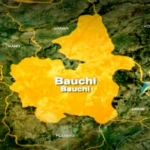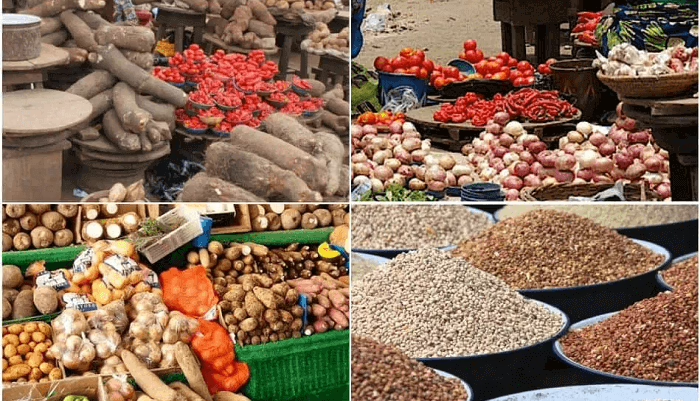According to reports from our field correspondents, the cost of essential food commodities continues to show varied trends across different states nationwide.
While certain regions are witnessing significant price declines, others are facing either stagnant or rising costs, despite ongoing federal government interventions.
Earlier this month, President Bola Tinubu mandated a Federal Executive Council committee to swiftly implement strategies aimed at further lowering food prices throughout the country.
Senator Aliyu Sabi Abdullahi, the Minister of State for Agriculture and Food Security, revealed this directive during a training session for Senate correspondents. He emphasized the importance of securing agricultural produce transit routes to minimize logistics expenses.
Nigeria’s food security challenges have intensified since the removal of the fuel subsidy, which led to a sharp increase in transportation costs. Additionally, persistent insecurity along key highways continues to disrupt the efficient distribution of food items.
Despite government efforts, millions of Nigerians still find staple foods unaffordable.
To combat this, the government plans to introduce a Farmer Soil Health Scheme aimed at enhancing agricultural productivity, alongside reforms in cooperative societies to mobilize resources and empower rural farmers.
“The President has demonstrated strong commitment to the cooperative sector as a vital mechanism for resource mobilization, economic growth, and improving members’ livelihoods,” Abdullahi stated.
In his Democracy Day address at the National Assembly in June, President Tinubu reaffirmed his administration’s dedication to achieving food self-sufficiency, highlighting the ‘Nigeria First’ policy as a foundation for market-driven economic development.
Jigawa State: Food Prices Plunge by Nearly 45%
Jigawa State has experienced a dramatic drop in food prices, with costs falling by almost 45% compared to the previous year.
At Shuwarin Market, a prominent weekly trading hub, a local measure (mudu) of beans now costs ₦2,500, down from ₦5,000 last year. Similarly, a 50kg sack of indigenous rice is priced at ₦50,000, a significant decrease from ₦85,000.
Millet prices have tumbled from ₦3,000 to ₦1,000 per mudu, while maize is now ₦1,200, compared to ₦2,700 previously.
Farmers in Dutse, the state capital, express concern over selling their harvests at a loss due to these falling prices.
Maize farmer Muhammad Lawan lamented, “We sell a bag of maize for ₦30,000, but our production costs exceed that. If this trend continues, farming next season may become unsustainable.”
Local merchants note that while consumers benefit from lower prices, producers bear the brunt of the financial strain.
Niger State: Grain Prices Halved
Grain prices in Niger State have dropped by approximately 50% compared to last year, according to a survey conducted in Minna and nearby areas.
Rice now sells for ₦1,600 per mudu, down from ₦3,000, while maize prices have fallen from ₦1,500 to ₦700, maintaining stability over the past three months.
Housewife Rukaiya Abdul remarked, “Such price steadiness hasn’t been witnessed in years. With ₦5,000, one can now purchase five large yam tubers, whereas it used to cost ₦20,000.”
However, farmer Ahmed Abubakar cautioned that despite the price drops, producers are still facing losses due to high input costs. He warned that prices might decline further during the peak harvest period without government assistance.
Abia State: Declining Prices for Garri, Rice, and Beans
In Abia State, staple food prices have generally decreased over the past month or two. Garri prices have fallen from ₦90,000-₦95,000 to ₦55,000-₦60,000 per bag, while beans have dropped from over ₦200,000 to between ₦120,000 and ₦130,000.
Local rice (100kg) is now ₦110,000, down from ₦180,000, and Nigerian foreign rice (59kg, destoned) costs ₦68,000-₦70,000, reduced from ₦85,000-₦90,000. Foreign rice (50kg) has also decreased to ₦105,000-₦110,000 from ₦130,000-₦140,000.
Prices for sweet potatoes and palm oil have seen slight declines, though yam prices remain volatile, ranging from ₦2,500 to ₦5,000 per tuber depending on size.
Major food distributor Clement Nnaji anticipates further price drops as supplies from the Middle Belt region increase. However, he expressed concerns that poor road conditions and insecurity could impede these reductions.
Kaduna State: Steady but Gradual Price Declines
Markets in Kaduna are witnessing slow but steady decreases in food prices, attributed to federal government initiatives.
At Television Market, trader Joy Ashibi confirmed, “Rice prices have fallen from ₦2,200-₦2,300 per mudu to ₦1,900-₦2,000. Old maize dropped from ₦800 to ₦650, and new maize is priced between ₦500 and ₦550.”
Restaurant owner Adams Sunday, operating near Sabon Tasha Expressway, also noted price reductions: “Rice bags I used to buy for ₦80,000-₦90,000 now cost ₦60,000-₦65,000, and beans are ₦105,000 per bag. New maize sells for ₦30,000.”
Yam prices, however, remain relatively high, with five small tubers costing ₦5,000 and larger ones priced between ₦1,300 and ₦1,500, according to yam seller Shehu Lamido.
Anambra State: Beans and Rice Prices Fall, Yam and Palm Oil Rise
In Anambra, while beans and rice prices are declining, the cost of yam and palm oil is on the rise.
Trader Chief Uzodinma Eze at Eke Awka Market reported, “Beans that sold for ₦180,000-₦230,000 last year now go for ₦100,000-₦120,000. Local rice prices have dropped from ₦48,000-₦50,000 to ₦38,000-₦40,000.”
Conversely, palm oil prices have surged, with Mrs. Linda Ukwueze noting, “A 25-litre container that cost ₦55,000 last year now sells for ₦70,000.”
Osun State: Mixed Price Movements
In Osun State, staple food prices show uneven trends, with some items decreasing slightly while others remain stable or increase.
At Akindeko Market in Osogbo, rice, maize, and beans have seen modest price drops, but yam and palm oil prices are steady or rising.
Trader Mrs. Funmilayo Ayeni shared, “Rice has decreased from ₦2,300 to ₦2,000 per mudu, and beans from ₦2,500 to ₦2,100. However, yam prices remain unchanged, with medium tubers selling for ₦1,200 or more.”
Another trader, Mr. Sulaimon Adeyemi, attributed the slight price reductions to increased harvest supplies but noted that insecurity and high transport costs limit further declines.
Delta State: Uneven Price Changes
Food prices in Delta State vary by commodity and location, with some items becoming cheaper while others stay costly.
At Ogbogonogo Market in Asaba, trader Mrs. Juliet Okonkwo observed, “Rice and maize prices have dipped slightly, but palm oil and yam remain expensive. A 25-litre keg of palm oil recently rose to ₦68,000 from ₦60,000.”
Consumers like Mr. Kingsley Anene hope for more price reductions soon, especially with the resumption of schools and rising household expenses.
Plateau State: Yam and Maize Prices Remain High
Despite the harvest season, Plateau State continues to experience elevated prices for some staples.
At Terminus Market in Jos, trader Mrs. Amina Danjuma reported, “Yam remains costly, with five medium tubers priced at ₦7,000. Maize bags sell for ₦45,000, down from ₦60,000 a few weeks ago.”
She attributed the sustained high prices to insecurity in farming areas and rising transportation expenses.
Kebbi State: Price Drops Amid Persistent Challenges
In Birnin Kebbi, food prices are declining due to ongoing harvests, but high input costs continue to challenge farmers and traders.
Grains dealer Alhaji Bala Gwandu stated, “A 100kg bag of local rice has fallen to ₦60,000 from ₦85,000. Millet and guinea corn prices are also decreasing.”
He cautioned that without subsidies or improved logistics, prices may rise again after the harvest season concludes.
Imo State: Selective Price Reductions
In Imo State, prices for some staples like beans and rice are falling, while others such as yam and palm oil remain high.
At Relief Market in Owerri, trader Mr. Chibuzor Umeh said, “Beans have dropped to ₦120,000 from ₦200,000, and rice prices are slightly lower. However, yams and palm oil continue to be costly.”
Shoppers like Mrs. Theresa Onuoha are adjusting by purchasing smaller quantities and modifying their diets.
Kano State: Fluctuating Food Prices Persist
Food prices in Kano continue to fluctuate without a clear downward trend in some markets.
At Dawanau International Market, traders report that while new harvests have eased maize prices, insecurity and fuel costs still hamper transportation.
Wholesaler Malam Musa Aliyu noted, “Maize prices have dropped to ₦42,000 per 100kg bag from ₦55,000, but rice and beans prices remain largely unchanged.”
He called on the government to enhance support for farmers and transporters.
Ekiti State: Varied Opinions on Food Prices
Residents of Ekiti State hold differing views on current food prices, with some noticing slight decreases, others observing stability, and some reporting increases.
In Ado Ekiti, housewife Mrs. Adenike Ajayi mentioned that rice, beans, and garri prices have slightly declined. “Last year, a small bucket of rice sold for ₦3,500, beans ranged between ₦3,000 and ₦5,000, and garri was ₦700 to ₦1,000. Now, prices have dropped by over 40% for many items,” she said.
A market survey found that a bag of foreign rice sells for ₦67,000, local rice for ₦52,000, and small containers of foreign and local rice go for ₦2,500 and ₦2,200 respectively.
Farmer Olakunle Adeyanju acknowledged the price reductions but noted they are minimal due to high transportation costs. He urged the government to reduce fuel prices to ease these burdens.
Market woman Mrs. Jayeoba added that despite slight price drops, many people still cannot afford staple foods. “Only the wealthy can buy a full bag of rice; most buy smaller quantities. Before the previous administration, a bag of rice was under ₦10,000, making it accessible to most households. We hope for a return to those times.”
Trade Union Congress (TUC) chairman in the state, Comrade (Dr.) Omotola Farotimi, agreed that food prices are stabilizing and decreasing compared to last year, despite overall inflation.
Labour Advocates for Living Wage Amid Rising Costs
Eugene Manji, Plateau State chairman of the Nigeria Labour Congress (NLC), expressed readiness to renegotiate the minimum wage in light of the escalating cost of living.
He emphasized the need for a living wage that reflects the increasing expenses of food, transportation, housing, education, and healthcare.






















